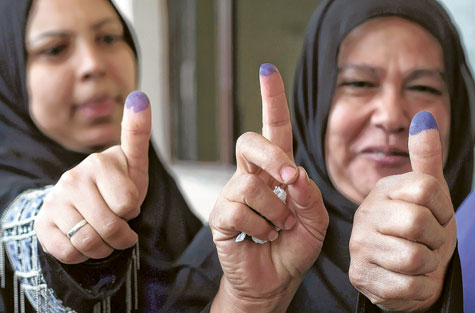
Cairo: Among the potent symbols of the Arab spring is one that has been less photographed and remarked on than the vast gatherings in Tahrir Square. It has been the relocation of the offices of the Muslim Brotherhood, the once banned party, now set to take the largest share of seats in Egypt's new parliament.
Before May this year they were to be found in shabby rooms in an unremarkable apartment block on Cairo's Gezira Island, situated behind an unmarked door. These days the Brotherhood is to be found in gleaming new accommodation in the Muqatam neighbourhood, in a dedicated building prominently bearing the movement's logo in Arabic and English.
Welcome to the age of "political Islam", which may prove to be one of the most lasting legacies of the Arab Spring. It is not only in Egypt that an unprecedented Islamist political moment is playing out. In the recent Tunisian elections the moderate Islamist Al Nahda party was the biggest winner, while Morocco has elected its first Islamist prime minister, Abdelilah Benkirane.
In Yemen and Libya, too, it seems likely that political Islam will define the shape of the new landscape.
None of which should be at all surprising. Indeed, if elections in Egypt and Tunisia had been held at any other time in the past two decades, the same result would almost certainly have ensued, reflecting both the levels of organisation of Al Nahda and the Brotherhood and the countries' cultural, economic and social dynamics.
"It was a change that was supposed to happen a long time ago," says Omar Ashour, who lectures on the subject of political Islam at Exeter University and is currently in Cairo.
So what, precisely, does the rise of electoral Islamist politics mean for the Middle East and North Africa?
"Islamism is a term that has been used to describe two very different trends," wrote Maha Azzam, an associate fellow at Chatham House, in a recent paper on the implications of the Arab spring for British foreign policy earlier this year. "First, [it describes] the non-violent quest for an Islamic-friendly society based on the ‘principles of Islam', which can involve a more liberal application of Islamic teachings and tradition or a more strict interpretation. Second, Islamism is also associated with violent extremism, most notably that of Al Qaida in the promotion of terrorism."
‘Too early to say'
Azzam, like a number of experts, is firm in the belief that, if the Arab spring has demonstrated anything about Islamism today, it is how those cleaving to the second, violent definition have become ever more marginalised in the Arab world.
Speaking to The Observer last week, Azzam said that, while it was "too early to say" how the policies of the Islamist parties thrown to the forefront of the Arab spring would play out in the region's present transformation, Islamist parties, for now at least, were looking to the centre.
"In Tunisia, Al Nahda was always more open-minded and with a more liberal attitude towards secular politics. Now we have the Muslim Brotherhood in Egypt leaning more towards the centre."
In Tunisia there has been a firm disavowal by the founder of Al Nahda, Rashid Ganouchi, of the Iranian theocratic model in favour of the Turkish one represented by the moderate Islamist AKP of President Abdullah Gul and the prime minister, Recep Tayyip Erdogan.
While it has its critics, that Turkish Islamist model has seen an essentially pragmatic approach to the country's largely secular institutions that has sought to avoid conflict with the military while attempting to raise both living standards and the economy.
If the example of Turkey is seen as a way forward, the case of the Muslim Brotherhood in Egypt vividly illustrates the huge challenges facing the newly resurgent Islamist parties as they attempt to govern. "It has learned from what happened in Algeria and also in Gaza with Hamas' conflict with the west," said Ashour.
Despite that, he believes that the Brotherhood will have to negotiate a difficult period of democratic transition in which the generals cling on to "power but not legitimacy" and its political arm, the Freedom and Justice party, dominates the new parliament with a "popular mandate but little power".
The Freedom and Justice party, which includes a minority of Christian Copts, has gone out of its way to say it seeks a constitution that respects Muslims and non-Muslims, will not impose Islamic law and is committed to a pluralistic and democratic Egypt.
Different agenda
In the midst of this challenge, and with Egypt's economy on the floor, the Brotherhood will operate in an entirely new political landscape, where a strong showing in the polls by the more fundamentalist Salafist Al Nour party exerts a gravitational pull on one side, while liberal secularists and Egypt's middle classes and business community push for their own agenda.
It is this, perhaps, that explains the somewhat contradictory pick-and-mix affair that is the Freedom and Justice party's "manifesto" as revealed in statements and releases designed to appeal to as wide an audience as possible.
It insists it has no objection to women and Christians standing for any government position except the presidency.
Economically, the party appears to be attempting to steer a middle course. It supports free markets and private ownership, while insisting that the state needs to provide protection for underprivileged groups and asking trade unions to desist from action that might damage the country's fragile economy.
In the most controversial areas of Sharia and women's rights, the Brotherhood has insisted that women should participate in politics, while the state should be a "civil one", led neither by the military nor clerics, but informed by the "makased", the underlying objectives of Sharia.
— Guardian News & Media Ltd












